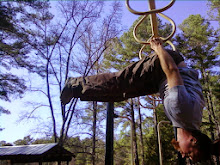The kettlebell world seems to have developed some differences that are almost “sectarian” in their intensity with each side presenting their approach as the “one true way”. You seem to have risen above this: you are one of the top rated RKCs but have also become certified by the IKFF in a slightly different style of kettlebell lifting. Why?
The schism that you talk about however is the domain of keyboard ninjas and Internet warriors. The forums are awash with people who's opinions are tougher than their training . This type of brinkmanship is endemic in the Martial arts, fuelled by people who spend too much time thinking rather than doing. The Kettlebell is a ball of iron with a handle on it! We aren't going to see any mind blowing innovations for that piece of equipment. So people argue about what you should do with it. You have to ask what is it about an individual's agenda that can only be promoted by criticizing others? "My Guru can beat up your Guru!" I don't think there are any credible coaches, teachers or trainers out there who resort to this. People can be drawn together through mutual respect or collective contempt. I'll roll with anyone who offers an empty hand, an open mind and a smile on their face.
I think there has been a lot of Internet “hype” about kettlebells over the last 10 years or so but the big benefit has been that this has refocused people on simple functional movements and intense routines. Do you think the “tool” – the lump of metal with a handle - can ever distract people from these essentials?
There is a huge amount of "smoke and mirrors" about training in general. The constant need to turn every aspect of activity into a science or a certification can suck the joy out of, what for most people should be, straight forward endeavour. The practice I promote is one of longevity, functionality and resilience. If your interest is always based on "more" then you will ultimately see diminishing returns. If your progress is based on "better" - improving movement, becoming resilient - then you have the prospect of a lifetime practice.
You ensure that mobility has a high profile in the conditioning classes that you teach. When did you start to realise the importance of joint mobility and how do you integrate it into your daily life and training?
At Kettlebells Scotland we call it Mandatory Mobility. It is non-negotiable. Every workshop begins with a mobility practice that anyone can do. Once I integrated mobility into my practice I noticed big changes in posture, movement, balance, speed, strength, outlook. The incredible pay off from mobility work should not be under played. Without mobility you become a slave to your body's compensations. Mobility is freedom of movement. I'd go as far as to say Mobility is freedom. We've somehow come to accept - in the West at least - that age means decrepitude. Without mobility there is no strength, no power, no health. You stop being the hunter and you become the prey.

This is Mt. Errigal, in Ireland, not far from where my in laws live. Once a year, my mum and da-in law, climb to the top of this mountain. My wife and I get a call from their mobile phone every time..."guess where we are?"
THIS is mobility as we age. (Not to mention that I can't even get a cell phone signal up in the Appalachains sometimes, and in the rural Northwestern coast of Ireland, they are calling from the top of a mount--go figure.)
Now, get on with it!!!
.jpg)


No comments:
Post a Comment